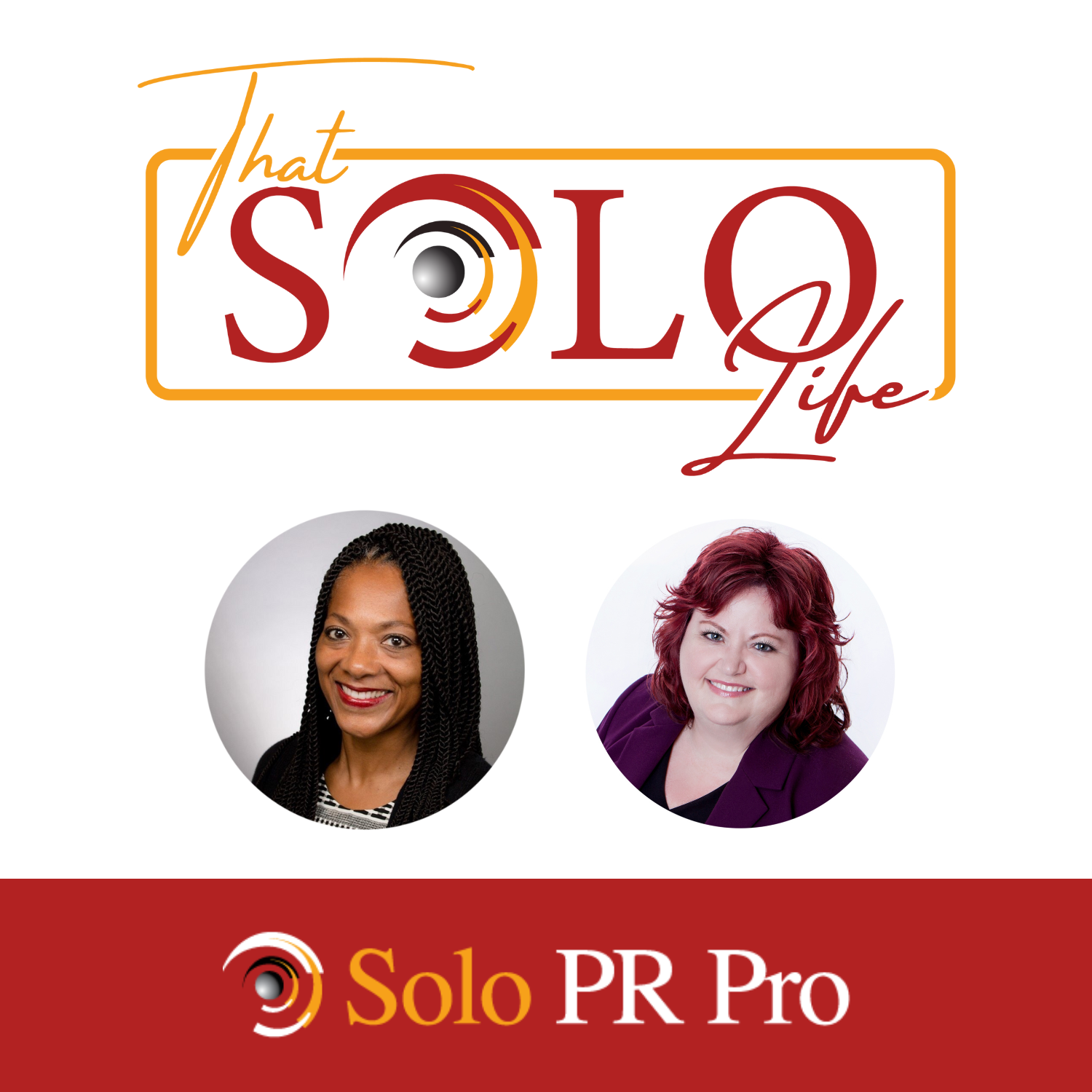
28.9K
Downloads
302
Episodes
That Solo Life: Co-hosted by Karen Swim, founder of Words for Hire, LLC and owner of Solo PR Pro and Michelle Kane, founder of VoiceMatters, LLC, we keep it real and talk about the topics that affect solo business owners in PR and Marketing and beyond. Learn more about Solo PR Pro: www.SoloPRPro.com
Episodes

Monday Jun 16, 2025
The Powerful Insights Learned From Going Back To School
Monday Jun 16, 2025
Monday Jun 16, 2025
That Solo Life Episode 304: The Powerful Insights Learned From Going Back To School
Episode Summary
Join hosts Karen Swim, APR and Michelle Kane as they welcome Veleisa Patton Burrell, an accomplished PR professional and educator. Together they explore the twists and turns of Veleisa's career—from solo entrepreneurship to agency life, and now as an adjunct professor guiding the next generation of communicators. This candid conversation covers career transitions, the evolving role of PR, the integration of AI in the workplace and education, and the importance of critical thinking. Prepare to be inspired by Veleisa's insights on mentorship, resilience, and finding balance in a challenging job market.
Episode Highlights
- Veleisa's 20-year career in PR and communications
- The decision to shift between solo work, agency life, and teaching
- How teaching has reignited her passion for storytelling and mentorship
- The role of AI in PR and education, and how to use it as a tool rather than a crutch
- The importance of curiosity, critical thinking, and learning from failure
- Encouraging the younger generation to be authentic and build meaningful careers
- Tips on setting boundaries for a healthy work-life balance
Episode Timestamps
[00:13] Introduction to the episode and Veleisa Patton Burrell
[01:37] Veleisa shares her career background and transition to solo work in 2017
[03:22] Teaching as an adjunct professor and rediscovering excitement for the field
[07:53] Inspiring the next generation through storytelling and shared values
[13:09] The impact of failure and fostering resilience in your career
[19:57] Insights on balancing work with personal boundaries and self-care
[21:17] Exploring the role of AI in education and PR, and critical thinking as a foundational skill
[28:00] Closing thoughts and where to follow Veleisa
About Veleisa Patton Burrell
Veleisa Patton Burrell is a trusted counselor to clients and peers alike, providing strategic guidance on integrated communications, including media relations, content development, digital communication and executive visibility. Her talents lie in detailing company values through owned storytelling consistently across mediums to earn media coverage and improve reputation with employees, partners, and clients and industry peers.
Most recently, as an executive for FleishmanHillard, a global PR agency, and Denny’s, a storied restaurant brand that is known as “America’s Diner,” Veleisa advised senior leaders on issues and crisis, developed media relations strategies and oversaw execution of thought leadership opportunities such as speaking engagements and interviews.
Side work as a mindfulness facilitator and yoga instructor keeps Veleisa’s mind and body strong and resilient. She graduated from Southern Methodist University in Dallas, Texas, with a bachelor’s degree in corporate communications and public affairs; she now teaches an undergraduate capstone course at the school as an adjunct professor. She later earned a master’s degree in communication studies from the University of Texas at Arlington. Veleisa was named to Public Relations Society of America Dallas inaugural 40 Under 40 list in 2021 and was previously a board director for the chapter.
You can connect with Veleisa on LinkedIn.
Related Episodes & Additional Resources
- Ragan: Denny’s Veleisa Patton Burrell on embracing tech and the changing comms landscape
- Nature: The effect of ChatGPT on students’ learning performance, learning perception, and higher-order thinking: insights from a meta-analysis
- World Economic Forum: Why AI literacy is now a core competency in education
- Forbes: Organizations Are Saving Millions By Embracing Curiosity—Here’s The Proof
Host & Show Info
That Solo Life is a podcast for public relations, communication and marketing professionals that work as independent and small hosted by Karen Swim, APR and Michelle Kane. Karen is the founder of Words For Hire, a PR agency that specializes in B2B, Technology and Healthcare, and the President of Solo PR, a community dedicated to independent practitioners in public relations, communications and related fields. Michelle Kane is the Principal of Voice Matters, a company that offers PR, Communications Consulting, Editorial and Voiceover Services.
Talk to Us
Subscribe and Share
Don’t miss an episode! Be sure to subscribe to "That Solo Life" on your podcast platform of choice. Love what you hear? Share the episode with your colleagues and friends, and leave us a review to help more listeners find the podcast. Engage with us on social media—we'd love to hear your thoughts!
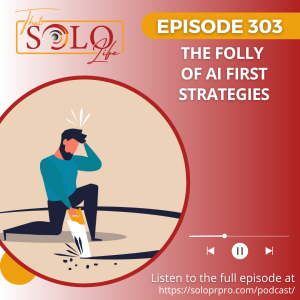
Monday Jun 09, 2025
The Folly of AI First Strategies
Monday Jun 09, 2025
Monday Jun 09, 2025
That Solo Life, Episode 303: The Folly of AI First Strategies
Episode Summary:
In this episode of That Solo Life, co-hosts Karen Swim, APR of Solo PR Pro and Michelle Kane of Voice Matters explore the growing trend of adopting an “AI-first” strategy in business and marketing. While artificial intelligence has proven to be a valuable tool, Michelle and Karen argue for a balanced approach that prioritizes human expertise and thoughtful integration. They discuss examples of companies misusing AI, how it impacts customer experiences, and smart ways organizations can combine AI with human intelligence for the best outcomes. The episode is a must-listen for PR pros and marketers navigating the evolving digital landscape.
Episode Highlights:
- The risks of an AI-first strategy: Why adopting AI without enough forethought or balance creates inefficiencies, costs, and poor customer experiences.
- Examples of misuse: Companies like Xfinity and Business Insider illustrate how over-reliance on AI can backfire.
- The human factor: The importance of human intelligence in areas like PR, customer service, and even medical diagnostics.
- Using AI wisely: How organizations can leverage AI as a complementary tool rather than a full replacement for human effort.
- Lessons for PR pros: Why PR professionals must adapt to AI tools while continuing to demonstrate their unique value to organizations.
Episode Timestamps
- 00:18 - Introductions and episode overview.
- 00:48 - The rise of AI in marketing and business strategies.
- 01:40 - Examples of companies going all-in on AI and walking it back (Duolingo, Business Insider).
- 02:34 - Michelle and Karen discuss Xfinity’s chatbot issues and the customer frustration it causes.
- 04:36 - Why prioritizing customer experience should always come first.
- 05:25 - Effective uses of AI in ad tools and automation versus areas where human expertise is irreplaceable.
- 07:17 - Human connection and the ongoing need for person-to-person community in a digital age.
- 09:57 - The integration of AI in PR and marketing fields; potential risks and opportunities.
- 12:04 - How PR pros can become trusted advisors by skillfully blending AI tools with human insight.
- 12:53 - Closing thoughts and encouragement to share the episode.
- 00:12:56 - Conclusion and Call to Action
Related Episodes & Additional Resources
- PR Daily: Business Insider layoffs
- Fast Company: Going ‘AI first’ appears to be backfiring on Klarna and Duolingo
- Brandnation: Social Media and AI
Host & Show Info
That Solo Life is a podcast for public relations, communication and marketing professionals that work as independent and small hosted by Karen Swim, APR and Michelle Kane. Karen is the founder of Words For Hire, a PR agency that specializes in B2B, Technology and Healthcare, and the President of Solo PR, a community dedicated to independent practitioners in public relations, communications and related fields. Michelle Kane is the Principal of Voice Matters, a company that offers PR, Communications Consulting, Editorial and Voiceover Services.
Talk to Us
Please Share and Review
If you found this episode helpful, please share it with your network! Don’t forget to subscribe to That Solo Life for weekly insights tailored for PR pros and solo marketers. You can also connect with us at SoloPRPro.com with your questions or comments. Thank you for listening!
Please leave a review here - even a sentence helps. Share and tag us (@SoloPRPro) on social media so that we can thank you personally!
Thanks for listening! 🎙️
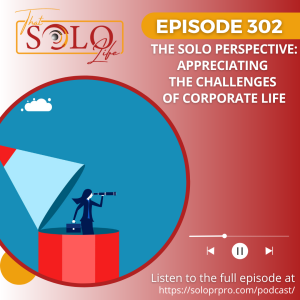
Monday Jun 02, 2025
The Solo Perspective: Appreciating The Challenges Of Corporate Life
Monday Jun 02, 2025
Monday Jun 02, 2025
Episode Summary:
What’s it really like to hop the fence between corporate life and solo entrepreneurship? Join co-hosts Michelle Kane of Voice Matters and Karen Swim of Solo PR Pro in this lively discussion about the contrasts between these two worlds. From navigating corporate protocols to enjoying the streamlined, impactful decision-making as a solo pro, they explore the lessons learned, the unique challenges, and the joys of creating your own career path. Whether you’re considering becoming your own boss or just want to appreciate your current work environment, this episode offers valuable insights and some laughs along the way.
Key Highlights:
- How experiences in solo and corporate careers shape your perspective.
- The beauty of streamlined decision-making as a solo professional.
- Challenges like “buzzword overload” and imposter syndrome in corporate spaces.
- Why being a solo doesn’t mean you lack the sophisticated processes of corporate life.
- Tips for appreciating both sides and finding fulfillment in your career choice.
- Thoughts on evolving professionally and taking control of your career in a modern work landscape.
Timestamps:
- 00:12 – Introduction and banter about the weather.
- 01:08 – Kicking off the topic: life as a solo vs. corporate life.
- 03:38 – Karen reflects on government and corporate inefficiencies.
- 04:10 – The benefits of streamlined workflows as a solo.
- 06:28 – Why protocols exist and how they affect workplaces.
- 07:57 – The challenges of self-perception as a solo.
- 09:20 – Controlling your career path and the rewards of solo life.
- 10:48 – How the modern work environment enables pivoting and flexibility.
- 11:44 – Closing thoughts and encouragement for listeners.
Related Episodes & Resources:
- Episode 286: What You Need to Know to Become a Solo PR Pro in 2025
- Episode 287: Confidence, Capability and Why PR Needs More Collaboration
- Learn more about SoloPRPro.com
Please listen and share!
Did today’s episode resonate with you? Share your experiences with us at SoloPRPro.com. And don’t forget to subscribe to That Solo Life wherever you listen to podcasts. If you enjoyed this conversation, leave us a review, and share the episode with a fellow PR pro or entrepreneur! See you next time!
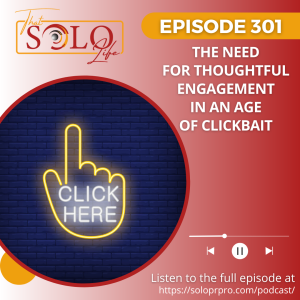
Monday May 26, 2025
The Need for Thoughtful Engagement in an Age of Clickbait
Monday May 26, 2025
Monday May 26, 2025
Episode 301 - The Need for Thoughtful Engagement in an Age of Clickbait
Podcast Hosts: Karen Swim, APR & Michelle Kane
Release Schedule: New episodes every Monday
Episode Summary:
In this thought-provoking episode of That Solo Life, Karen and Michelle take a critical look at the current state of social media and the challenges of thoughtful engagement in a world dominated by clickbait culture. They discuss how the drive for visibility and engagement often leads to misinformation, manipulation, and the decline of meaningful discourse.
The hosts share their perspectives as PR professionals on the deeper responsibility of fostering ethics and trust in communication. They emphasize the importance of slowing down to verify facts, maintaining integrity, and modeling critical thinking, especially for clients navigating today’s fast-paced information landscape.
Key Takeaways:
- The Clickbait Conundrum: Once a space for genuine connections, social media is now overwhelmingly driven by metrics and visibility at the expense of authenticity.
- The Role of PR Pros: Public relations professionals have a responsibility to fight misinformation and help clients maintain trust through transparent communication practices.
- Guardrails for Brands: Karen and Michelle suggest bringing back foundational tools like fact sheets, Q&A documents, and newsroom pages to ensure an official “source of truth” for your brand.
- Critical Thinking: The hosts stress the need for slowing down, questioning narratives, and taking the time to verify information before reacting or sharing.
- Community Still Matters: Despite the digital noise, authentic engagement and human connection remain the most impactful strategies for building trust and loyalty.
Quotes from the Episode:
- “People are sharing, posting, and reacting so quickly that critical thinking often takes a back seat.”
- “We need to bring back tools like fact sheets and Q&A docs to ensure the public has easy access to the truth.”
- “Community and genuine connection will always outperform clickbait in the long run.”
Related Episodes and Additional Resources
- That Solo Life: The New Challenges in Managing Brand Reputation
- That Solo Life: Quality Over Quantity Will Drive PR In 2025
- Smart Social Secrets: Why Social Media Posting Isn’t Working - And What to do Instead!
- Social Media Examiner: Social Media Marketing Industry Report
Timestamps:
00:00:00 - Introduction to That Solo Life
00:00:18 - The Busy Season: Maycember
00:01:12 - Here We Go Again: Social Media Manipulation
00:02:11 - The Shift in Social Media Motives
00:03:23 - The Importance of Community Content
00:04:01 - The Exhaustion of Misinformation
00:05:17 - The Role of PR Professionals in Social Media
00:06:03 - Creating Fact Sheets for Transparency
00:07:15 - Protecting Clients with Social Media Policies
00:08:32 - The Importance of Controlling Your Own Narrative
00:09:20 - Providing Journalists with Clear Messaging
00:10:27 - The Need for Critical Thinking
00:11:41 - The Decline of Critical Thinking in Education
00:12:56 - Modeling Critical Thinking in PR
00:13:21 - Conclusion and Call to Action
Why You Should Listen:
If you're a PR professional, marketer, or business owner navigating the complexities of content creation and engagement on social media, this episode is for you. Karen and Michelle provide actionable advice on combating misinformation, maintaining ethics, and fostering meaningful connections in a world of constant digital noise.
About the Show:
That Solo Life is a podcast for public relations, communication and marketing professionals that work as independent and small hosted by Karen Swim, APR and Michelle Kane. Karen is the founder of Words For Hire, a PR agency that specializes in B2B, Technology and Healthcare, and the President of Solo PR, a community dedicated to independent practitioners in public relations, communications and related fields. Michelle Kane is the Principal of VoiceMatters, a company that offers PR, Communications Consulting, Editorial and Voiceover Services.
Talk to Us
- Karen Swim - LinkedIn, Threads, Instagram
- Michelle Kane - LinkedIn, Instagram
- Solo PR - LinkedIn, Facebook, Instagram
Leave us a Review
Please leave a review here - even a sentence helps. Share and tag us (@SoloPRPro) on social media so that we can thank you personally!
Thanks for listening! 🎙️ Have a topic you’d like us to cover? Drop us a line at Solo PR Pro.
Enjoyed this episode? Share your thoughts with us at Solo PR Pro or on social media. Don’t forget to tag fellow PR pros who could benefit from these insights! Tune in next Monday for another episode of That Solo Life.
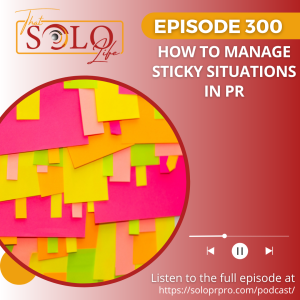
Monday May 19, 2025
How To Manage Sticky Situations In PR
Monday May 19, 2025
Monday May 19, 2025
That Solo Life Podcast, Episode 300
Episode Title
How To Manage Sticky Situations In PR
Episode Summary
Welcome to the 300th episode of That Solo Life! 🎉 Karen Swim, APR, and Michelle Kane reflect on their podcasting milestone before tackling a topic every PR professional can relate to – dealing with "sticky situations." From unscripted comments in interviews to inappropriate client behavior at events, Karen and Michelle share experiences, insights, and strategies to prepare for and manage these challenges with professionalism. They emphasize preparation, setting clear boundaries, and protecting your own reputation as a PR practitioner while navigating these tricky waters.
If you’ve faced a PR crisis or want to be fully equipped for when one arises, this episode is packed with relatable stories and actionable advice.
Episode Highlights
- The Importance of Preparation
Why media training, briefing sheets, and understanding client boundaries are non-negotiable steps.
- Clients Behaving Badly
Memorable (and eyebrow-raising) examples of client mishaps during events or interviews, and lessons learned.
- When Damaging Information Emerges
What to do when unexpected or concerning information about your client surfaces.
- Protecting Yourself and Your Reputation
Tips on maintaining contracts, financial safeguards, and crisis plans for PR pros themselves.
- The Role of Ethical Responsibility
Navigating PR crises while adhering to ethical practices and maintaining professionalism.
Related Episodes and Additional Resources
- Podcast - How to Communicate in a Crisis
- Podcast - The Joy and Pain of Clients New to PR
- Blog - How to Handle Tough Client Conversations
- Learn more about ethical PR practices with PRSA’s Code of Ethics.
Timestamps
- 00:18 - Celebrating 300 episodes
- 02:21 - Sticky situations with clients and what defines them
- 05:00 - Events gone wrong and handling inappropriate client behavior
- 08:42 - Unscripted comments during interviews and the importance of being present during media interactions
- 13:30 - Concerning or damaging information surfacing about a client
- 15:31 - Crisis communication plans for PR pros and self-protection strategies
That Solo Life is a podcast for public relations, communication and marketing professionals that work as independent and small hosted by Karen Swim, APR and Michelle Kane. Karen is the founder of Words For Hire, a PR agency that specializes in B2B, Technology and Healthcare, and the President of Solo PR, a community dedicated to independent practitioners in public relations, communications and related fields. Michelle Kane is the Principal of VoiceMatters, a company that offers PR, Communications Consulting, Editorial and Voiceover Services.
Talk to Us
- Karen Swim - LinkedIn, Threads, Instagram
- Michelle Kane - LinkedIn, Instagram
- Solo PR - LinkedIn, Facebook, Instagram
Leave us a Review
Please leave a review here - even a sentence helps. Share and tag us (@SoloPRPro) on social media so that we can thank you personally!
Thanks for listening! 🎙️ Have a topic you’d like us to cover? Drop us a line at Solo PR Pro.
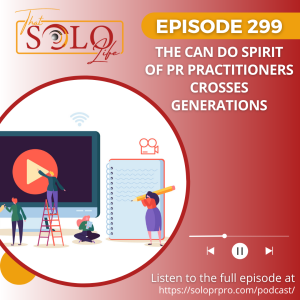
Monday May 12, 2025
The Can Do Spirit of PR Practitioners Crosses Generations
Monday May 12, 2025
Monday May 12, 2025
That Solo Life Episode 299
Episode Title
The Can Do Spirit of PR Practitioners Crosses Generations
Episode Summary
The hosts, Karen Swim, APR, of Solo PR Pro, and Michelle Kane of VoiceMatters, discuss key findings from the USC Annenberg Global Communication Report for 2025, focusing on Gen Z’s growing presence in the workforce and what that means for public relations professionals.
Key takeaways include:
- Flexibility prioritized over pay: Nearly half of Gen Z employees value workplace flexibility more than higher salaries, suggesting shifting work-life balance priorities.
- Concerns over AI's impact: A significant portion of Gen Z is worried about AI diminishing entry-level job opportunities, highlighting the need for AI skills development.
- Generational perceptions: A fascinating generational divide exists regarding political and social awareness, with each group believing they are the most informed.
- Hybrid work benefits: The hosts advocate for hybrid work not only as a productivity tool but also as a way to encourage intergenerational mentorship and develop soft skills.
- The PR industry’s optimistic outlook: Despite challenges like evolving technology and the hybrid landscape, 74% of PR professionals report a positive outlook for the sector.
Karen and Michelle also explore how these findings tie back to independent professionals, emphasizing the importance of flexibility, adaptation, and mentorship in today’s workforce.
Episode Highlights
1. Flexibility Over Pay:
Gen Z is reimagining priorities, highlighting the value of flexible schedules over strictly financial incentives. Karen and Michelle explore how this impacts public relations and solo professionals.
2. The AI Factor:
The hosts discuss Gen Z's concerns about AI in the workplace, citing the importance of staying ahead of trends, acquiring new skill sets, and leveraging AI as a tool rather than fearing it as a replacement.
3. Hybrid Work and Mentorship:
Hybrid work models provide opportunities for not only business productivity but also intergenerational learning. Karen and Michelle explain how being physically present for mentorship can bridge generational gaps and help develop critical soft skills.
4. Optimism in the PR Industry:
Despite disruptions, PR professionals maintain an optimistic outlook. The hosts celebrate this shared resilience and problem-solving spirit that defines the PR community.
Related Episodes & Additional Resources
- USC Annenberg Global Communication Report 2025
- Solo PR Pro resources for independent professionals here.
Timestamps
00:00:00 - Introduction to That Solo Life Podcast
00:00:28 - The Impact of Gen Z on the Workforce
00:01:41 - Workplace Flexibility and Generational Perspectives
00:02:53 - Balancing Work and Life: A New Approach
00:04:17 - The Hybrid Workplace: Benefits and Challenges
00:06:30 - AI's Influence on Job Opportunities for Gen Z
00:07:40 - The Importance of Mentorship Across Generations
00:09:35 - Generational Differences in Knowledge and Awareness
00:11:46 - Reflections on Past Experiences and Current Realities
00:13:06 - Optimism in the PR Industry's Future
00:14:15 - Conclusion and Resources
Host & Show Info
That Solo Life is a podcast for public relations, communication and marketing professionals that work as independent and small hosted by Karen Swim, APR and Michelle Kane. Karen is the founder of Words For Hire, a PR agency that specializes in B2B, Technology and Healthcare, and the President of Solo PR, a community dedicated to independent practitioners in public relations, communications and related fields. Michelle Kane is the Principal of VoiceMatters, a company that offers PR, Communications Consulting, Editorial and Voiceover Services.
Talk to Us
- Karen Swim - LinkedIn, Threads, Instagram
- Michelle Kane - LinkedIn, Instagram
- Solo PR - LinkedIn, Facebook, Instagram
Leave us a Review
Please leave a review here - even a sentence helps. Share and tag us (@SoloPRPro) on social media so that we can thank you personally!
Thanks for listening! 🎙️ Have a topic you’d like us to cover? Drop us a line at Solo PR Pro.
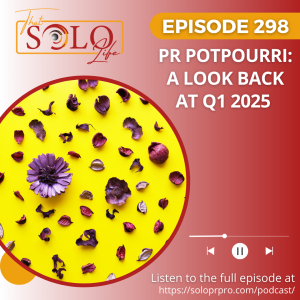
Monday May 05, 2025
PR Potpourri: A Look Back at Q1 2025
Monday May 05, 2025
Monday May 05, 2025
That Solo Life, Episode 298: PR Potpourri: A Look Back at Q1 2025
This podcast episode explores the challenges that PR professionals face in the current media and communication landscape. The discussion covers several key topics:
- The struggles with PR tools and technologies, which often fail to keep up with the rapidly changing industry. This leaves PR practitioners having to "hack together" solutions to get the job done.
- The broader cultural issues of overwork and lack of work-life balance in the PR and communications field, which contribute to fatigue and burnout.
- The challenges of cutting through the "sensationalism" and "brain candy" that dominates much of today's media, and finding ways to effectively share meaningful, ethical, and responsible messaging.
The hosts emphasize the importance of PR professionals upholding their integrity and values, while also adapting to connect with audiences in creative and engaging ways. Overall, the conversation highlights the unique blend of skills and resilience required to succeed as a communicator in the current environment.
Episode Summary:
Join co-hosts Karen Swim, APR, and Michelle Kane as they take you on a lively and insightful ride through the current state of public relations, pop culture, and the challenges of living the #SoloPR life in 2025. This isn’t just one topic; it’s a mix of everything that’s shaping the PR landscape today. From the highs and woes of PR tools to the emotional (and professional) toll of our 24/7 work culture, Karen and Michelle share their honest thoughts with moments of humor, empathy, and real-world advice.
What You’ll Learn in This Episode:
- An honest review of today’s PR tools, touching on media monitoring, analytics, and pitching databases.
- How the evolving media landscape and shrinking newsrooms are forcing PR pros to become more creative in their strategies.
- The societal fatigue impacting professionals across industries and how it weighs on productivity and expectations.
- Why sensationalism and aesthetics dominate public attention and what PR pros can do to create impactful, ethical, and relatable messaging.
- The power of storytelling in PR, regardless of how complex or mundane the topic may seem.
Key Quotes from the Episode:
💬 "We have to focus on messaging and packaging it in a way that breaks through to an audience that really prizes aesthetics." – Michelle Kane
💬 "I miss the days when PR tools gave us everything we needed for one price. Now? Higher prices, less functionality." – Karen Swim
💬 "Public relations professionals are among the best of us. We’re not just serving our clients—we’re truly serving their publics." – Karen Swim
Resources and Links Mentioned:
- Solo PR Pro Community: SoloPRPro.com
- Connect with Karen Swim on LinkedIN
- Follow Michelle Kane on LinkedIN
- Share your thoughts on this episode or send us feedback at Solo PR Pro Contact Us.
About the Hosts:
Karen Swim, APR, is the Founder and CEO of Words For Hire, a PR Agency and the Owner of Solo PR Pro, a community and resource hub that supports PR professionals working independently. Michelle Kane is the owner of Voice Matters, a company that offers branding and marketing, integrated content strategies, and measurable public relations.
Tune in and Stay Inspired! 🎙️
Connect with Us:
- Visit our website: Solo PR Pro
- Share your thoughts and feedback: info@soloprpro.com
- Follow us on Instagram, Facebook, LinkedIn
Listen Now: Apple Podcasts | Spotify | Solo PR
Enjoyed the episode?
Please leave a review here - even a sentence helps. Share and tag us (@SoloPRPro) on social media so that we can thank you personally!
Join the Conversation
Found this episode valuable? Share it with your network, and don’t forget to subscribe so you never miss a new episode!
Tune in and learn how to become a trusted advisor to your clients in an increasingly tone-sensitive world.

Monday Apr 28, 2025
The Big Idea with Jess Sato
Monday Apr 28, 2025
Monday Apr 28, 2025
That Solo Life - Episode 296: The Big Idea with Jess Sato
Episode Summary
This episode of That Solo Life dives deep into the world of business growth, messaging, and creating meaningful impact. Co-hosts Karen Swim, APR of Solo PR Pro, and Michelle Kane of Voice Matters are joined by special guest Jess Sato, a business growth and visibility strategist. Jess shares powerful insights on how purpose-driven entrepreneurs and thought leaders can identify their “big idea,” use it to stand out in a crowded marketplace, and create lasting change. Whether you’re looking to refine your messaging, grow your visibility, or tackle roadblocks on your entrepreneurial path, this episode offers actionable strategies and thought-provoking advice to move the needle in your work.
Key Takeaways
- Defining the Big Idea: A “big idea” doesn’t have to be completely new. Instead, it’s an audacious or bold concept that challenges the status quo, demands attention, and inspires action.
- The Bolt Method Framework: Jess's Bolt Method helps clarify and amplify big ideas by focusing on four pillars - Bold, Original, Loud, and Tenacious.
- Living Your Passion: Entrepreneurs can align their personal passions with business objectives to create both purpose and profit.
- Overcoming Challenges: Common roadblocks like imposter syndrome, impatience, or messaging struggles can be overcome with introspection and strategy.
- The Power of Rebuilding: If your work no longer feels aligned, don’t be afraid to take the time to pause, reflect, and pivot to rediscover your authentic purpose.
About Jessica “Jess” Sato
Jessica Soto is a business growth and visibility strategist who helps purpose-driven female entrepreneurs, thought leaders and change makers clarify their big ideas, amplify their message and create lasting social impact. In this podcast episode, she discusses her process for helping clients find their "big idea" - a bold, original perspective that challenges the status quo and inspires people to take action. Soto highlights common roadblocks her clients face, such as distilling complex expertise into a cohesive core message, and provides strategies for overcoming these challenges. She also advises on building a platform for thought leadership, evolving one's message over time, and the importance of authenticity and transparency with one's audience.
Episode Timeline
- [00:00] - Introduction from co-hosts Karen Swim and Michelle Kane
- [00:32] - Welcoming guest Jess Sato and learning about her background in corporate strategy and leadership development
- [01:14] - Jess describes her transition to working with female entrepreneurs and social impact leaders
- [03:33] - The definition of a big idea and why it doesn’t have to be groundbreaking to be bold or impactful
- [05:12] - How passion, experience, and identifying audience needs converge to form a functional big idea
- [09:13] - Common roadblocks faced by entrepreneurs when refining and presenting their big ideas
- [13:03] - The Bolt Method explained and how it helps craft unique and powerful messaging
- [20:13] - Aligning your big idea with platforms, stages, and communication styles to amplify your message
- [26:02] - Evolving your message and giving yourself permission to pivot when your work no longer feels aligned
- [35:12] - What it means to create a lasting legacy through your work and voice
- [37:05] - How to connect with Jess Sato and closing thoughts from the co-hosts
Resources & Links
- Connect with Jess Sato on LinkedIn
- Visit Jess Sato’s website at jessicasato.com
- Learn more about Solo PR Pro at soloprpro.com
Connect with the Hosts
- Karen Swim, APR - Solo PR Pro, LinkedIn
- Michelle Kane - Voice Matters, LinkedIn
Subscribe & Review
Enjoyed this episode? Subscribe to That Solo Life on your favorite podcast platform and leave us a review! Your support helps us share inspiring conversations with solo PR pros and marketers everywhere.
We hope you enjoy this conversation with Jess, Karen, and Michelle!
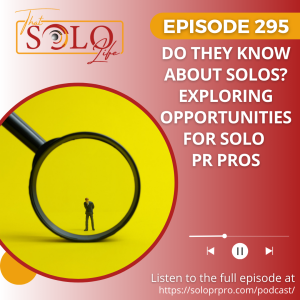
Monday Apr 14, 2025
Do They Know About Solos? Exploring Opportunities for Solo PR Pros
Monday Apr 14, 2025
Monday Apr 14, 2025
In This Episode
What exactly do Solo PR Pros do, and how do companies find and engage with them? Many businesses are on the lookout for talented professionals to help with marketing, communications, and PR, but they often don’t know where to start. This week, Karen and Michelle unpack how Solo PR Pros can make themselves more visible and connect with companies that need their services. From networking tips to leveraging LinkedIn and exploring industry forums, they discuss practical strategies to help you stand out.
Whether you’re a seasoned Solo or new to the game, this episode will inspire you to take actionable steps toward growing your business and increasing your visibility in a competitive market. Tune in and discover how to ensure that businesses not only know about solos—but understand the value you bring to the table.
Key Topics Discussed
- The demand for Solo PR Pros and the uncertainty many companies feel about finding and hiring them.
- Why some businesses are unaware of what Solo PR Pros do and how this creates opportunities for visibility.
- The importance of maintaining an active presence in industry forums, local chambers, and online networks like LinkedIn.
- Creative strategies for meaningful networking, from casual coffee chats to hosting workshops and community events.
- How solos can repurpose content and boost their own SEO to increase discoverability.
- The changing landscape of human connection and why face-to-face engagement still matters in a digital world.
Why You Should Listen
If you’ve been wondering how to better position yourself as a Solo PR Pro or how to find new opportunities despite economic uncertainty, this episode is packed with advice to help you put yourself out there. Karen and Michelle share personal anecdotes, practical tips, and motivational insights to empower you to take the reins and ensure companies know you exist—and understand the immense value you provide.
Resources Mentioned
- Solo PR Pro Premium Membership Group
- PRSA
- Local networking opportunities (e.g., chambers, trade groups, or hosting small events at coffee shops or libraries)
Get Engaged
We want to hear from you! Have questions, comments, or ideas for future episodes? Reach out to us at soloprpro.com.
If you found this episode helpful, please share it with your network. Your support means the world to us, and it helps us reach even more Solo PR Pros!
Follow Us:
- Michelle Kane | Voice Matters
- Karen Swim | Solo PR Pro
- Podcast Website | That Solo Life
Have thoughts on today's topic? Connect with us on social media and share your perspective.
Enjoyed the episode?
Please leave a review here - even a sentence helps. Share and tag us (@SoloPRPro) on social media so that we can thank you personally!
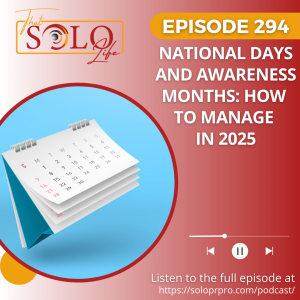
Monday Apr 07, 2025
National Days and Awareness Months and How to Manage in 2025
Monday Apr 07, 2025
Monday Apr 07, 2025
That Solo Life, Episode 294: National Days and Awareness Months and How to Manage in 2025
Summary:
This podcast episode discusses the abundance of "national days" and how PR professionals and marketers should approach aligning their client initiatives with these events. The key points are:
- There is an overwhelming number of these "national days" which can become diluted and ignored by the public.
- These days can be divided into two categories: awareness/educational campaigns vs. marketing-driven events.
- For awareness months/days related to important causes, it can make sense to align content and messaging if it's relevant to the client's business. However, marketers should be cautious about aligning with more frivolous "national days" just for the sake of participation.
- The most important factor is whether the client's news, announcement, or content is truly newsworthy and valuable, regardless of whether it aligns with a designated national day or month. Forcing an announcement to fit a particular calendar event is not advised.
- PR professionals should set clear expectations with clients about which national days/months are worth aligning with versus when it may be better to simply focus on the strength of the news itself.
In This Episode
Are you overwhelmed by the never-ending list of national days, weeks, and months? From National Hot Dog Day to Domestic Violence Awareness Month, it feels like every moment in the calendar is claimed by something. But does your brand have to jump on every single one?
In today’s episode, co-hosts Karen Swim, APR (Solo PR Pro) and Michelle Kane (Voice Matters) discuss how to strategically decide which awareness and marketing campaigns to align with (and when to pass). They share practical advice for PR pros, marketers, and business owners on how to cut through the clutter while staying authentic to your brand.
What We Discuss in This Episode:
- The evolution of National Days and how their popularity has changed over time.
- The difference between awareness campaigns that educate (e.g., Autism Awareness Month) versus marketing-driven moments (e.g., National Ice Cream Day).
- Why staying true to your brand’s mission is key when deciding whether to participate.
- Evaluating client expectations and helping them decide if their campaigns align with specific days or months.
- How doing something outside of a marketing or awareness month can sometimes help your message stand out.
- Tips for advising clients on when their big news deserves attention at the right time.
Key Takeaways:
- Not every campaign is necessary. Assess whether a national day or awareness month is relevant and meaningful to your brand or clients before joining in.
- Awareness vs. gimmicks: Distinguish between educational campaigns that offer real value and marketing "fun" that may not add much.
- Timing is everything. Great news is great news, no matter what day you share it. Don’t feel tied to these campaigns if they don’t serve your goals.
Listener Reminder:
We’re not throwing shade at National Donut Day (a very worthwhile occasion, honestly!), but don’t feel obligated to latch on to every trendy day in the calendar. Use these moments as tools—but only when they make sense for your brand!
Mentioned in This Episode:
- How to align content with National Days effectively without overwhelming your brand strategy.
- Examples of when leveraging awareness months like Domestic Violence Awareness Month can reinforce your brand’s values.
Special Invite:
If you found value in today’s conversation, we’d love for you to share this episode with your network! Whether via audio or on YouTube (yes, you can see our fabulous faces there too!), your support helps us bring more tips to PR and marketing pros like you. And don’t forget to leave us a rating or review—we can handle it 😉
Thanks for listening to this episode of That Solo Life! Until next time!
Follow Us:
- Michelle Kane | Voice Matters
- Karen Swim | Solo PR Pro
- Podcast Website | That Solo Life
Have thoughts on today's topic? Connect with us on social media and share your perspective.
Enjoyed the episode?
Please leave a review here - even a sentence helps. Share and tag us (@SoloPRPro) on social media so that we can thank you personally!
